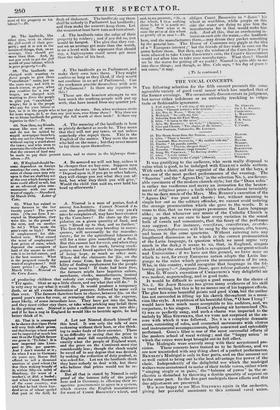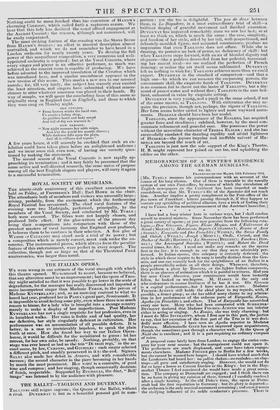THE VOCAL CONCERTS.
THE following selection for the fifth concert presents the same agreeable variety of good vocal music which has marked that of the former evenings. We occasionally discern errors in judgment, but never either indolence or an unworthy truckling to vulgar taste or fashionable ignorance. 1. Full Anthem, " I will sing of thy power," Dr. GREENE. 2. Gilt*, "Through nature's wide domain," Sir .1. L. Roorns.
3. Air, Mrs. G. Wow), " Hear me," CHERUBINI. 4. Madrigal. " So salt!' my fair," L. MARENZIO. 5. Selection from the First Mass, MOZART.
6. Glee, " 0 listen to the voice," J. B. SALE. 7. Aria, Mr. Itersurr, " All Sofia I " (Sargino), PAER. FL Glee and Chorus, The shades of the heroes," T. Coon"E.
9. New Fantasia, Violoncello. Mr. LINDLEY.
10. The Storm Scene from the Seasons, HAYDN.
11. Glee, " There is beauty " Goss. 12. Canzouet, Miss STEPHENS, " My mother hide me," HAYDN.
13. Duetto. " Ah guarda sorella." Mosaay. 14. Madrigal, " Thyrsis, steepest thou?" BENNETT.
15. Terzetto, " Tremate, empj tremate," ITHOVEN.
16. Song. Mr. CHAPMAN, " -Ye fleeting shades," HANDEL. 17. Glee. " Lovely seems." CALLCOTT. Is. Chorus, Glory to the Caliph" (Oberon), WEBER.
It was gratifying to the audience, who seem really disposed to value what is good, to be indulged with GREENE'S noble anthem. With such a choir, and the organist of the Abbey at the keys, it
was one of the most perfect performances of the evening. The " Sanctus " and the " Agnus Dei," in the selection No. 5, are favour- able specimens of the modern church style; but the "Dona nobis" is rather too vociferous and merry an invocation for.the bestow-
ment of religious peace ; a fault which attaches almost invariably to the mcdern music of the Mass. Mrs. BISHOP'S execution of the
" Agnus Dei" was pure and chaste ; but, without meaning to single her out as the solitary offender, we cannot avoid noticing the strange pronunciation which she gave to the words. It is come to this, that no two singers pronounce the Latin language alike; so that whenever any music of the Catholic Church is sung in parts, we are sure to hear every variation in the sound both of vowels and consonants, that the fancy of the performer
may suggest. For instance, crucifi.ru.s, crucefeexus, eratehe- feerus, crootchefee.roose, will be sung by the soprano, alto, tenore, and basso in the same quartetto. Without entering into any lengthened discussion as to which is the correct pronunciation
of the Latin language, (a question which we must argue very much in the dark,) it seems to us, that, in England, singers
should adopt the standard which is recognized in our great schools and Universities : if we have not this ground, we have none on which to rest, for every European nation adapts the Latin lan- guage to the rules which govern the pronunciation of its own. Who, in this country, would recognize that language in the fol- lowing jargon ?—"Annjoous Daae, quee toleese pahaata moonde." Mrs. G. WOOD'S execution of CHERUBINI'S very delightful air was modest, unpretending, and in good taste. It would be difficult to assign a good reason for the choice of No. 2. Sir JOHN ROGERS has given many evidences of his skill in vocal writing, but this is by no means one of his happiest efforts. The glee has some beautiful points and good ideas, but the author has not succeeded in filling up his sketch throughout in a musi- cian-like style. A repetition of his beautiful Glee, "0 how I long ! " would have been much more acceptable to his auditors, and, we conjecture, to his singers. Hoox's pleasing air harmonized (No. 6) was so perfectly sung, and such a charm was imparted to the melody by Miss STEPHENS, that we were not surprised at the en- core with which it was followed. No. 8 is a complete dramatic scene, consisting of solos, and concerted movements with chorus and instrumental accompaniments, finely conceived and splendidly performed. Goss's Glee is one of the most successful efforts of the modern school of vocal writing ; and the "happy union " in which the voices were kept brought out its full effect. The Madrigals were scarcely sung with their accustomed pre- cision. These concerts have trained us to be fastidious, and we are now unsatisfied with any thing short of a perfect performance. BENNEris Madrigal is only in four parts, and on this account not so well suited to bring out to the best advantage the power of the choir. Independently of the delightful use which the madrigal writers were accustomed to make of their treble voices, either when "singing singly or in pairs," the " balance of power" in the or- chestra is disturbed by throwing a double quantity of soprani on to the same part. In the five-part madrigals these effects and this due adjustment are preserved. We were happy to see Miss STEPHENS again in the orchestra, giving her pots erful assistance to this national vocal union. Nothing could be more finished than her execution of HAYDN'S charming Canzonet, which called forth a rapturous encore. We hear that this lady has declined the usual offered engagement at the Ancient Concert : the reasons, although not announced, will be easily conjectured. The most striking feature of the evening was the Storm Scene from HAYDN'S Seasons; an effort in musical description almost unrivalled, and which we do not remember to have heard in a London orchestra for nearly twenty years. To develop the full power of this magnificent composition, a very numerous and well- appointed orchestra is required ; but at the Vocal Concerts, where every singer and player is an effective performer, as much was achieved as the concert-room is capable of producing. We have before adverted to the improved translation of the Creation which was introduced here, and a similar amendment appeared in the new version of this scene. This marks a new sera in our musical annals ; for, till very lately, the subject has scarcely ever excited the least attention, and singers have submitted without remon- strance to utter whatever nonsense was placed in their hands. By way of sample, we will quote the concluding lines of this scene as originally sung in England (not in English), and those to which they were sung on Monday night.
OLD SE RSION.
" From heaven winks the lucid star, Us awaits a balmy sleep, As guiltless heart and body sound
And toil of day can warrant it."
NEW VERSION.
" Now night resumes her sable reign, And o'er the world her mantle throws; While darkness falls upon the plain, And all is stillness and repose."
A few years hence, it will scarcely be credited that such an ex- hibition could have taken place before an enlightened audience ; and we incur some risk even now, of having our veracity ques- tioned by making the statement.
The second season of the Vocal Concerts is now rapidly ap- proaching its termination ; and it may fairly be presumed that the same active and well-directed research, the same union of purpose among all the best English singers and players, will carry it again to a successful termination.





















 Previous page
Previous page